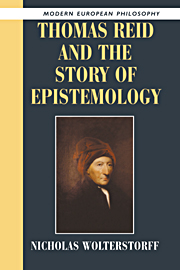Book contents
- Frontmatter
- Contents
- Preface
- Chapter I Reid's Questions
- Chapter II The Way of Ideas: Structure and Motivation
- Chapter III Reid's Opening Attack: Nothing Is Explained
- Chapter IV The Attack Continues: There's Not the Resemblance
- Chapter V Reid's Analysis of Perception: The Standard Schema
- Chapter VI An Exception (or Two) to Reid's Standard Schema
- Chapter VII The Epistemology of Testimony
- Chapter VIII Reid's Way with the Skeptic
- Chapter IX Common Sense
- Chapter X In Conclusion: Living Wisely in the Darkness
- Index
Preface
Published online by Cambridge University Press: 18 December 2009
- Frontmatter
- Contents
- Preface
- Chapter I Reid's Questions
- Chapter II The Way of Ideas: Structure and Motivation
- Chapter III Reid's Opening Attack: Nothing Is Explained
- Chapter IV The Attack Continues: There's Not the Resemblance
- Chapter V Reid's Analysis of Perception: The Standard Schema
- Chapter VI An Exception (or Two) to Reid's Standard Schema
- Chapter VII The Epistemology of Testimony
- Chapter VIII Reid's Way with the Skeptic
- Chapter IX Common Sense
- Chapter X In Conclusion: Living Wisely in the Darkness
- Index
Summary
There are signs today of a renaissance of interest in the philosophy of Thomas Reid; whether those signs are a portent remains to be seen. If so, it will indeed be a renaissance. Reid has almost disappeared from the canon used for teaching modern philosophy in the universities of the West. Yet from the last decade or two of the eighteenth century, on through most of the nineteenth, he was probably the most popular of all philosophers in Great Britain and North America and enjoyed considerable popularity on the continent of Europe as well. I myself judge him to have been one of the two great philosophers of the latter part of the eighteenth century, the other being of course Immanuel Kant.
Why has Reid almost disappeared from the canon? No doubt for a number of reasons; let me mention just three. For one thing, the reception of Reid's philosophy both trivialized and misunderstood him. It trivialized him by giving looming importance to his doctrine of Common Sense; it misunderstood him by failing to see the radicality of his rejection of the prior tradition of modern philosophy and treating him as if he justified us in forgetting about Hume and returning to Locke.
Second, scholarship in the history of philosophy lives and thrives on challenges to the interpretive skills of the scholar and on the controversies that ensue from different ways of meeting such challenges: Is there or is there not a vicious “Cartesian circle,” and so forth.
- Type
- Chapter
- Information
- Thomas Reid and the Story of Epistemology , pp. ix - xivPublisher: Cambridge University PressPrint publication year: 2000

